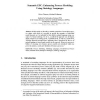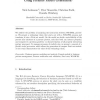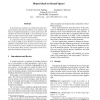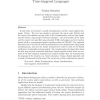419 search results - page 54 / 84 » Using Matrix Decompositions in Formal Concept Analysis |
ML
2007
ACM
13 years 7 months ago
2007
ACM
In many learning problems prior knowledge about pattern variations can be formalized and beneficially incorporated into the analysis system. The corresponding notion of invarianc...
ESWS
2007
Springer
14 years 1 months ago
2007
Springer
Abstract. In this article we describe a semantic extension of event-driven process chains, with which it is possible to specify the semantics of individual model elements as it is ...
DKE
2008
13 years 7 months ago
2008
We address the problem of analyzing the interaction between WS-BPEL processes. We present a technology chain that starts out with a WS-BPEL process and translates it into a Petri ...
CSFW
1998
IEEE
14 years 11 min ago
1998
IEEE
In security protocol analysis, it is important to learn general principles that limit the abilities of an attacker, and that can be applied repeatedly to a variety of protocols. W...
ENTCS
2006
13 years 7 months ago
2006
In this study, we introduce a model transformation tool for a time-triggered language: Giotto. The tool uses graphs to represent the source code (Giotto) and the target (the sched...




